PLEASE NOTE: The information in this blog is for educational purposes only. It is not a substitute for professional medical advice. Consult your healthcare provider if you’re seeking medical advice, diagnoses, or treatment.
Drug store shelves are lined with shampoos, creams, or other products claiming to solve (or improve) dandruff. Yet, most of these claims fall short and fail to address the actual causes of this challenge.
If you’ve dealt with dandruff, you know how uncomfortable and embarrassing it can be. Odds are you or someone you know has experienced dandruff at some point, as an estimated 50% of the population has (1).
Americans spend an estimated $300 million annually on over-the-counter products to treat dandruff (2).
Despite this level of spending, it’s still a major challenge.
In this article, we’ll take a closer look at the potential causes of dandruff, natural remedies, and diet and lifestyle changes to consider before reaching for another bottle of anti-dandruff shampoo!
Dandruff 101: What Is It?
The skin is your largest organ, and a diverse collection of microorganisms colonizes it. When these communities are thrown out of balance, challenges such as seborrheic dermatitis or dandruff may arise (3).
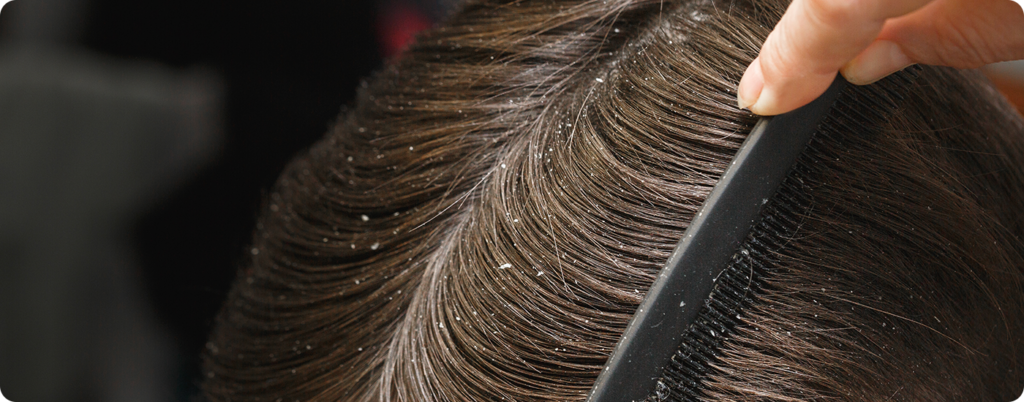
Dandruff is a common skin disorder, resulting in flaky, sometimes itchy skin. This excess skin is deposited in your hair (and eventually your clothing).
Dandruff appears to result from various contributors such as nutrition, stress, dry skin, and fungal overgrowth (4, 5, 6). Dandruff can result from conditions like psoriasis or eczema.
Many anecdotal reports claim that dandruff worsens during the winter months or during times of elevated anxiety.
Even certain personal care products contain chemicals that can lead to dry or irritated skin (more on this below).
Seborrheic Dermatitis is another closely related challenge. While dandruff is limited to the scalp and is less severe, seborrheic dermatitis can impact the scalp, chest, and face.
Powerful Diet Principles for Dandruff Relief
Dietary choices have a dramatic impact on your health. We suggest a few main principles to keep in mind when looking to overcome dandruff or related challenges.
1. Prioritize Well-Raised Animal Foods
Many Western diets lack critical vitamins, minerals, and essential fatty acids (like omega 3’s)(7).
Animal foods like muscle meat, organs, eggs, seafood, and dairy products contain various vitamins, minerals, growth factors, and peptides vital for skin and gut health (8, 9)
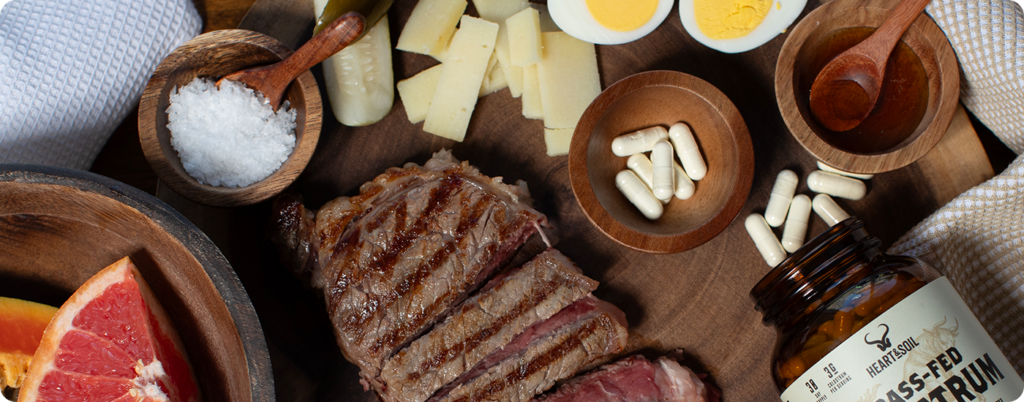
Animal foods are also an amazing source of omega 3’s. Fish oil, krill oil, and even the “high-end” cod liver oils oxidize quickly, potentially causing more issues than they solve.
So, we prefer to increase essential fatty acids via whole food sources. Great options are grass-finished lamb, beef brain, corn/soy-free egg yolks, salmon roe, and other wild-caught seafood.
We suggest an animal-based diet for most individuals! The animal-based diet prioritizes well-raised animal foods like meat, organs, raw dairy, and eggs, along with low-toxicity carbohydrates.
As Devon Haberman (a member of our animal-based community) found out, this way of eating can dramatically impact dandruff, energy levels, and more.
2. Avoid Processed Foods
Highly-processed options have largely replaced whole foods (animal foods, fruit, veggies, etc.).
Not to mention, these highly processed foods are often sprayed with pesticides, genetically modified, or contain artificial sweeteners and preservatives.

Unsurprisingly, many of these recent additions can negatively impact your health.
The main processed food to avoid is seed (or vegetable) oils. Oils like canola, corn, safflower, sunflower, soybean, cottonseed, peanut, and grapeseed contain excess linoleic acid.
Excess omega-6 polyunsaturated fatty acids, like linoleic acid, contribute largely to metabolic dysfunction, weight gain, and chronic disease.
They can also cause inflammation in the gut, which can manifest on the skin (10).
Unfortunately, these oils are found in processed foods and are used in many restaurants. Look out for these oils under the “Ingredients” of food labels and avoid them at all costs! Instead, opt for butter, tallow, or ghee.
Additionally, do your best to avoid fatty pork (bacon), chicken, duck, turkey, or other monogastric animals primarily fed corn and soy diets.
Like humans, these animals will store excess linoleic acid (omega-6 polyunsaturated fatty acid) in their adipose tissue (fat cells), which is easily absorbed by our bodies when consumed (11,12).
As Dr. Paul discusses in this podcast episode, artificial sweeteners (sucralose, aspartame, stevia, monk fruit, etc.) can alter a person’s insulin sensitivity, glucose tolerance, appetite, and gut flora.
In most cases, consuming natural forms of sugar like maple syrup, agave syrup, molasses, and especially fruit and raw honey is better.
3. Heal Your Gut
Gut and skin health are closely related and serve similar purposes (13).
- The gut and skin are both crucial for immune function.
- Both are covered with epithelial cells that directly interact with your external environment.
- The skin and gut host diverse bacterial, fungal, and viral species.
A compromised gut may result in inadequate absorption of nutrients and food sensitivities. It can also contribute to skin issues such as acne and psoriasis.
The road to improved gut health looks different for everyone, but diet and lifestyle habits are crucial. This looks like including nutrient-dense foods, eliminating processed foods, reducing stress, exercising, and getting restful sleep.
If you’ve followed Heart & Soil or Paul Saladino, MD, you’ve likely seen that we suggest avoiding or limiting leaves, stems, nightshades, and seeds (nuts, grains, and legumes) if you’re experiencing unpleasant symptoms.
The overconsumption of defense chemicals found in common plant foods can contribute to intestinal permeability (14,15,16). So, eliminating the most toxic plant foods can be crucial in healing your gut.
Many individuals with challenges like dandruff also benefit from eliminating gluten, lectins, artificial sweeteners, and emulsifiers (such as guar gum). Each of these can damage your gut!
Five Lifestyle Tips to Improve Dandruff
Challenges like dandruff also have a lifestyle component. Stress levels and exposure to certain toxins can aggravate your gut, skin, or other areas.
1. Reduce Stress
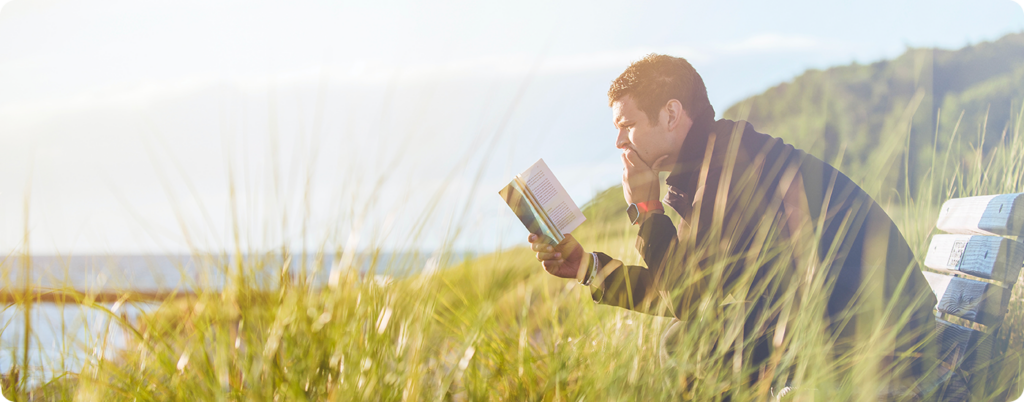
Stress and fatigue can cause or exacerbate inflammation (17).
Certain stressors can disrupt the skin microbiome, potentially leading to itching, scaling, and inflammation (18). Many people report that their dandruff worsens along with increased stress.
So it’s essential to:
- Prioritize a consistent sleep routine of at least 8 hours per night.
- Avoid overtraining, as excessive exercise can elevate cortisol levels.
- Engage in activities that promote relaxation, such as sunbathing, spending time with loved ones, and pursuing hobbies.
2. Get Some Sun
Remember to get outside, play in the sun, and reconnect with nature!
Getting sun is one of the best things you can do to improve your gut health, as sun exposure favors the gut microbiome (19). Vitamin D promotes intestinal health and can improve psoriasis (20, 21).
Sun exposure can also help your body enter its natural circadian rhythm cycle, which promotes sleep (22), recovery, muscle growth, and weight loss.
3. Choose Personal Care Products Wisely
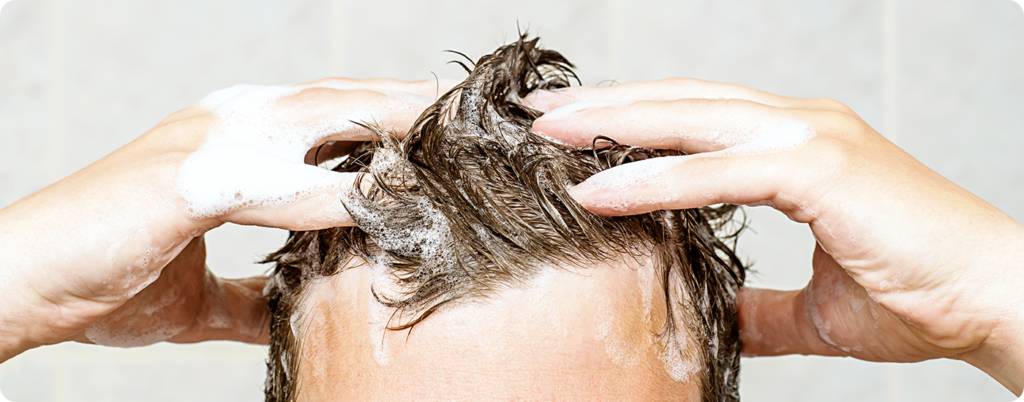
The skin is your largest organ, so what you put on it matters!
Modern personal care products can contain dozens of ingredients. Many of these are synthetic chemicals with potential consequences for your health (23).
Certain fragrance chemicals and preservatives in shampoos and other personal care products can irritate some individuals (24,25).
To help keep scalp inflammation at bay, those with sensitive skin should opt for fragrance-free products and avoid the ingredients that may lead to a reaction.
EWG is an excellent resource for finding cleaner personal care products. Chem Trust also has helpful insight on this topic.
We suggest looking for products made with coconut oil, tallow, olive oil, or other natural ingredients. Here are some brands to consider:
Seek to find balance in your hygiene routine. Excessive use of shampoo may strip natural oils from your hair and result in scalp irritation.
4. Reduce Exposure to Toxins
Your environment can dramatically impact your health.
Exposure to environmental toxins, such as certain chemicals, pollutants, or heavy metals, can trigger a variety of issues (26,27). To help offset the effects:
- Use air and water filters in your home.
- Choose natural cleaning and personal care products, glass and stainless steel, and clothing and bedding made from organic cotton, hemp, or bamboo, free from parabens and synthetic fibers (28). Check out Dr. Paul’s video on environmental toxins for more info.
- Choose organic produce to minimize exposure to pesticides.
- Engage in regular detoxification practices such as exercise and sauna sessions.
5. Work With a Professional
You may want to work with a professional if you’re already consistent with your diet and lifestyle but are still experiencing significant challenges.
Providers can run urine or stool tests to dig deeper into root causes, such as heavy metals, mold, parasites, and other environmental toxins. Candida overgrowth is commonly associated with dandruff. These are incredibly common today, yet they can fly under the radar!
If needed, check out the Society of Metabolic Health Practitioners, where you can find physicians from all around the globe who understand the immense value of making animal foods the center of the diet.
Another popular option is IFM Find a Practitioner for a functional medicine approach.
Natural Remedies for Dandruff
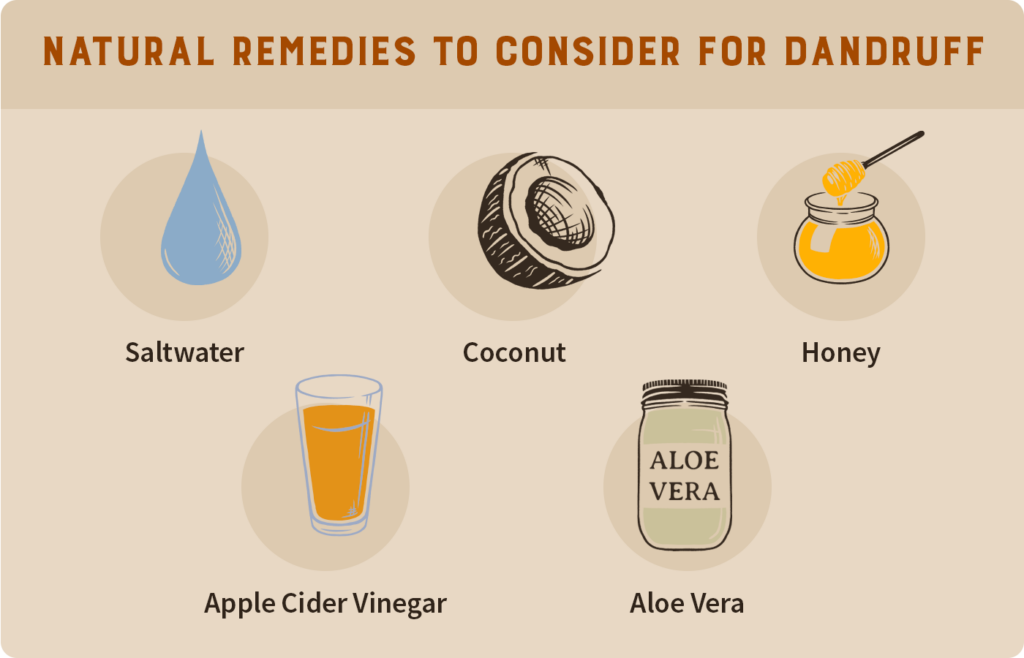
Each of the following options can help you naturally fight dandruff. Many of these are used as ingredients in higher-quality personal care products.
Saltwater
Salt is a common ingredient in many anti-dandruff shampoos. Saltwater can naturally exfoliate your scalp (remove dead skin cells) and remove excess oil.
It contains nutrients like magnesium, calcium, potassium, and zinc. Sodium chloride (salt) is known to have anti-fungal properties (29).
Coconut or Olive Oil
Coconut oil has potent antiviral, antimicrobial, and antifungal properties. Olive oil can naturally moisturize your scalp and soothe itching. Letting the oil sit on scaly patches for about an hour can help remove dandruff.
Honey
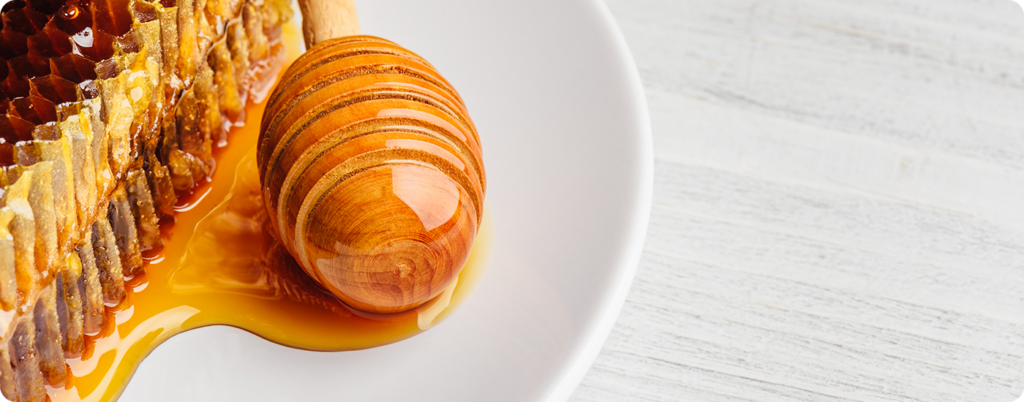
Not only does honey contain critical vitamins and minerals, but it also has antibacterial and antifungal properties.
In one study, patients with seborrheic dermatitis applied a mixture of honey and warm water to problem areas. The honey was left sitting for three hours before a warm water rinse. Each of the participants experienced improvements in itching and scaling (30).
Apple Cider Vinegar
A diluted solution of water and apple cider vinegar is a common remedy for dandruff due to its antifungal ability.
Aloe Vera
Aloe vera is a plant that grows easily in hot, dry climates. Historically, various cultures used it to treat burns, wounds, and infections.
Like honey, aloe vera has antifungal and antibacterial properties. It also contains vitamins E and C, which can support wound healing (31).
Wave Goodbye to Dandruff!
Dandruff can have a dramatic impact on your social life and self-esteem. It’s a sign that your health may be struggling in other areas (such as your gut).
While it’s still not completely understood why this challenge is so prevalent, it’s possible to see improvements from diet and lifestyle adjustments. There are also numerous natural remedies to consider instead of chemical-laden products.
Kick the bottle of Head & Shoulders to the curb and move on from dandruff!
Subscribe to future articles like this: